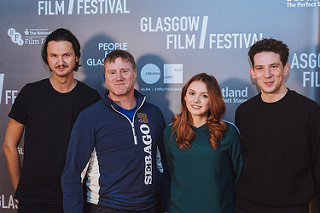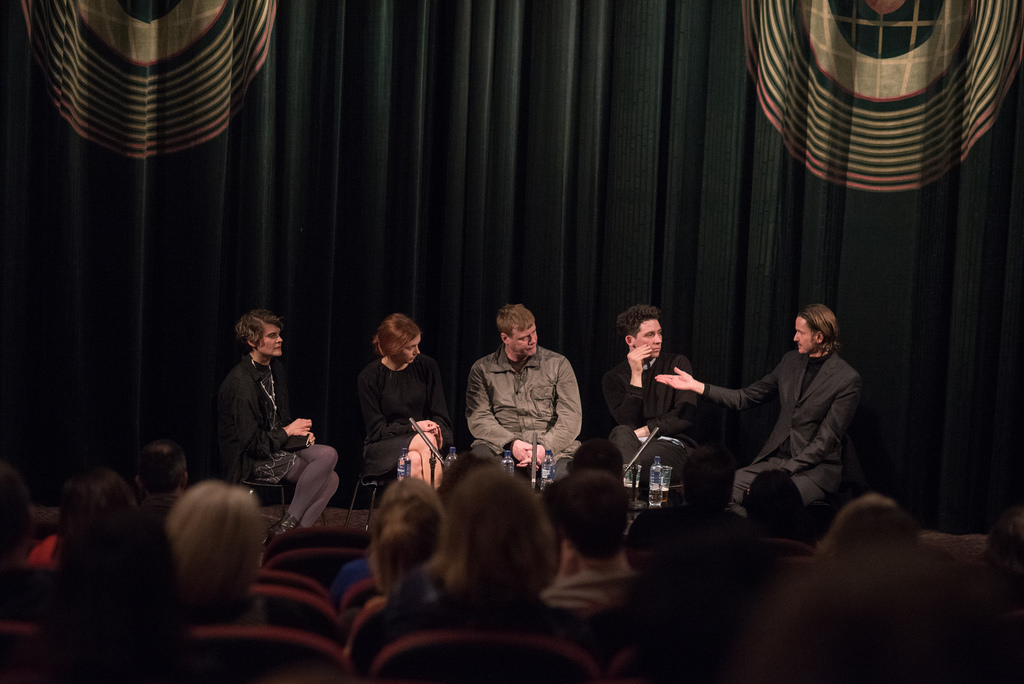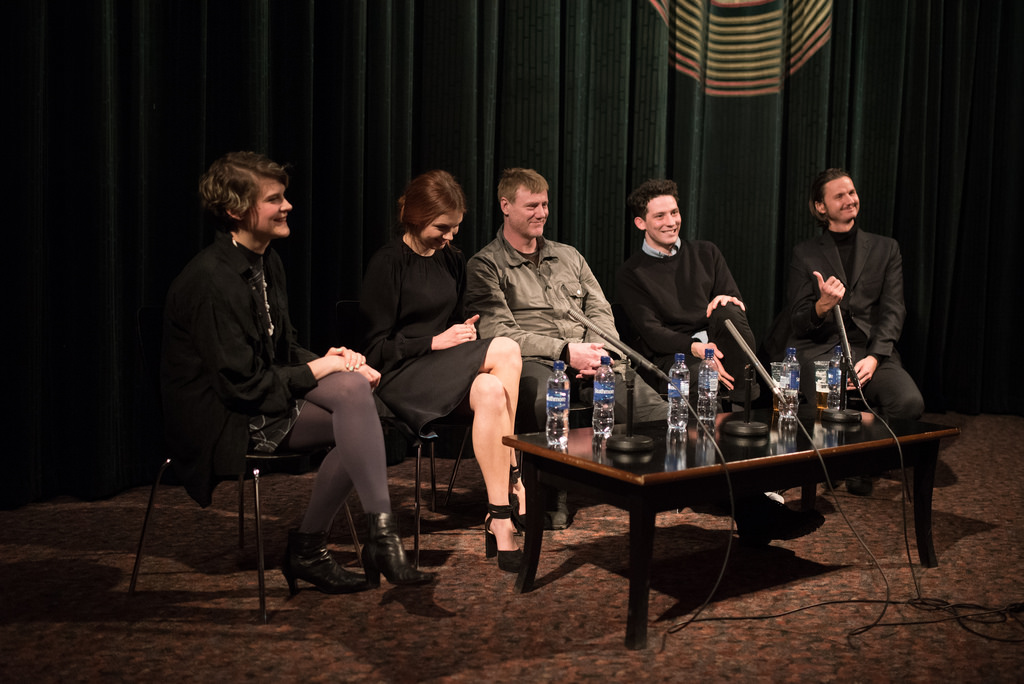After the sold out screening of BRIDGEND at the Glasgow Film Festival, director JEPPE RONDE and actors HANNAH MURRAY, JOSH O’CONNOR, and Steve Waddington sat down to answer the audience’s questions.
Bridgend follows a young girl who moves to a small Welsh town and quickly becomes friends with the local teenagers. Her father, who is investigating a series of suicides, soon discovers that her new friends may have a terrifying influence.
What drew you to the topic of suicide?
JR: I read it [Bridgend story] in a Danish newspaper. At the time, it was January 27th 2008 and at that time it was eight suicides. I went there straight after and within, I think three weeks, it was 17. So obviously, this was really fast. I didn’t know what was there, if there was a story, or a film or anything, or how that film was to be told, but I decided to go there to find out.
My personal reason is that I have some of that in me, or I have experienced stuff that is close to what happened there, you cannot compare of course. My dad was a drug addict, living alone with him, you could call it one long suicide. One of my best friends in primary school hung himself in the garage, and unfortunately in high school I had a girlfriend who killed herself. So, it’s something that has been close to me.
I don’t pick a subject, I think it picks me. Quite frankly, I would not be a filmmaker if I could choose, I’d rather be a carpenter or something else – seriously. Because of the background I’m from…my father, I thought he was dead many times because I was only like six, seven, calling the ambulance, getting drove to the hospital and back, I think I began to make stories at the time that would have a happy ending. So, already then I told stories to survive. So, I have to do these things, that’s the reason.
You spent seven years working on this?
JR: With shooting, yes. Six years was research, yes.
When you first visited there had been eight suicides, now there have been 79.
JR: Unfortunately, it’s a lot higher. There are no official numbers, that’s the only one we could find.
Would this event have been reported differently had it happened in Denmark?
JR: Yes we had, unfortunately, a cluster last year in Denmark. I know the media shut everything down here in 2010, in Denmark we don’t do that. The code of conduct here is quite different. If something is done in Denmark, it’s more thoroughly, and what, not only we but also experts have said is that it matters to talk about it – that’s the only thing that matters. If we are making a piece like this, it has to be thorough, right? You can’t just make a headline and sell some newspapers, that doesn’t really work for anyone, does it? So, that’s what we found out. Denmark still occupy Greenland and up there the suicide rate is much higher than in Wales or elsewhere. But, we found out in the North East there is a town where the suicide rate had been so high that… like in Denmark, the name for suicide is self-murder, not suicide. They changed it into self-murder because it has some impact when it is a murder, they think differently, that’s what they came up with, and then they started talking about it and the suicide rate came down. There was a big cluster in Silicon Valley, well-off parents but their kids started, you know, committing suicide. They started talking about it and the curve went down.
There is no solution or answer to the suicides at the end of the film, do you know why they did it?
JR: I’m not wiser than my film. Everything is in there, the film is probably wiser than I am. There are questions in the film, I’d say. I think there could be so many reasons in Bridgend that could be the truth; there must have been copycats, there must have been an agreement of doing it – it’s not a pact – I think that word is too strong. There was no manifest of things like that. So, there are many reasons, but they do not really give you the why.
Hannah, you were saying this is the first film where you have ever had a safeword?
HM: Yes, it’s the only film where I’ve had a safeword, for a bunch of stuff like the strangling [scenes], for a lot of the scenes where Steve is throwing me into cars. We wanted everything to feel very real and we wanted things to be spontaneous and things to happen in the moment. People were concerned that if I was saying ‘no’ or ‘stop’ as part of the scene and they were worried about my safety, so I think it [safeword] was ‘banana’.
What drew you to the character of Sara?
HM: I think that teenagers are generally interesting people. You’re at a very exciting stage in your life where you haven’t figured everything out yet, you’re still to find a sense of who you are, but you don’t know who you are yet. You’re at that strange boundary between being a child and being an adult. I think it is a really interesting time, I remember it being a really interesting time in my life. I always think teenagers can be incredible and super smart, super insightful, and also make really terrible mistakes and be really dumb sometimes. I think that those tensions and those contradictions are fascinating, both in real life and on-screen.
Did you find it quite a draining shoot?
JO: It was quite draining but we had a giggle as well. I know that’s terrible, it’s obviously not a comedy. They’re all over there, that lot [points to actors Patricia Potter, Scott Arthur, and Aled Llyr Thomas in the audience], and they were fun. You have to switch off with those things… It’s really intense and I think that at the end of each day we were exhausted – Hannah mostly, obviously. We were all very tired, but I guess it was always going to be a really tough story. By the end of the shoot we were exhausted.
I can’t imagine the water in those lake scenes was heated?
JO: No, it was November and we actually were naked! Hannah had to walk in slowly!
Steven, what drew you to your role?
SW: It was a terrific script and I wanted to do it. It was the best script I had ever read. You can’t really play being a policeman, that’s like a hat that you wear. He’s just a human being and he’s just a guy with his daughter who gets involved in this situation. I think it’s a beautiful film, it was very dark but it was absolutely beautiful, one of the best scripts I have ever read and I’ve been doing this for 30 years. I just thought Jeppe and his co-writers gave the actors lots of space for their characters to develop.
Was it heavily improvised?
SW: I wouldn’t say heavily improvised, there was embellishments and things, but we pretty much stuck to the script. Jeppe was kind enough to… if we wanted to go off track a bit, he would encourage that.
I imagine your character is a composite of all the parents in Bridgend?
SW: Yes, I guess he was a sign for that and he did symbolise parents who were concerned at this tragic situation.
Did you do a lot of research for your roles?
JO: We did a bit, didn’t we?
HM: Yeah, we did. We were only there for five weeks in total. That’s one of the unfortunate things nowadays is that to tell a story like this, you tend not to have a huge amount of money. The main research I did was I just read everything I could get my hands on. I read every story and every article I could find, including a lot of tabloid stuff, which I felt was very… it was the most upsetting to read because I felt it was very judgmental and not very compassionate. There was also a Vanity Fair article that I found particularly helpful.
Like Steve said, I think it was such a wonderful script and I felt it’s important to say that this is a fictional story. We’re not playing real people that these things have happened to, it’s a backdrop of real events. I think the biggest thing was to stay within the world of the script to stay true to our particular story.
What did the people of Bridgend think of your work there?
JR: Well the house they [Sara and Dave] move into is actually the local vicar’s house. We shot at the school, the pub, the police station. What I feared in the beginning, I feared they might come at us and smash our cameras because there have been violent incidents, we know this. We had extras [from Bridgend] who were helping us in various situations, so it was for me a very…happy is a strong word, but it was actually, that the community supported us like they did.
A release date has yet to be announced for Bridgend.
[Photographs courtesy of www.NeilThomasDouglas.com]































